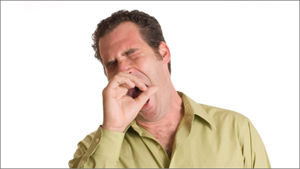Sleep Your Way to Better Science
by
 Although the summer heat is behind us, sleep remains a pretty hot commodity, particularly at this time of year when the academic cycle is just getting started. In many circles, people wear sleep deprivation like a badge of honor as evidence of how hard they’ve been working. But standing at the bench with bloodshot eyes, trying to remember why we’re standing there in the first place is hardly heroic…
Although the summer heat is behind us, sleep remains a pretty hot commodity, particularly at this time of year when the academic cycle is just getting started. In many circles, people wear sleep deprivation like a badge of honor as evidence of how hard they’ve been working. But standing at the bench with bloodshot eyes, trying to remember why we’re standing there in the first place is hardly heroic…
In the quest to become a better scientist, sleep plays an essential role. Breaking an experiment into it’s three phases, Planning, Execution and Analysis, helps highlight why getting a good night’s rest is well worth the effort.
.
Planning
A well-planned experiment has hope. A poorly-planned experiment does not. Great experimental planning pulls together seemingly disparate pieces of data to formulate an exciting new hypothesis. Thus, we are told to read the literature, go to seminars and attend conferences in order to increase our exposure to a diverse set of information that may be important for influencing our own work.
Of course, a key assumption in that advice is that we’ll actually be able to process the information we intake, even if it doesn’t seem to be related to our work. A recent paper published earlier this summer demonstrates that rapid eye movement sleep (REM) “enhances the integration of unassociated information for creative problem solving.” In other words, More sleep = Better problem solver.
In fact, 1938 German Nobel laureate Otto Loewi claims his key experiment came to him in a dream two nights in a row! (Since reading that I’ve kept a notepad next to my bed. Still waiting for some magic…)
.
Execution
Failed experiments aren’t always bad. If they failed because the hypothesis we tested was not correct, at least we learned something and we can move on to the next experiment.
However, when the failure is our fault, it’s the worst. These human errors can occur for two reasons: Innocence or Carelessness. The innocent errors are natural and part of learning. The experiments were executed perfectly, but they were conceptually flawed from the start. A vast majority of these types of mistakes will be made in the first two years of graduate school.
Careless errors should be as low as possible since they’re the real killer. They destroy the value of the experiment and force us to start over again. Nothing learned and time wasted.
To demonstrate the severity of the consequences of losing sleep, researchers compared the effects of sleep deprivation to those of alcohol consumption. It revealed that after 17-19 hours without sleep, subjects scored the same or worse on a series of tests than subjects with a 0.05% blood alcohol concentration (BAC). Further lack of sleep increased the deprived subjects’ “drunkenness.”
It’s unlikely that most of us would be as focus and error-free if we constantly felt as though we’d just finished a couple of beers. If we were, we’d likely see a lot more kegs in the lab.
.
Analysis
We’ve all had nights with little or no sleep and we know how difficult it can be to try to think about a particularly complex experiment in those situations. In addition to the physical processing of the data, there is the more important “so what?” aspect. What do the data mean? How does that affect the hypothesis? What is the next experiment? These are all critically important questions when analyzing an experiment and a clear head is generally the best tool to start answering them with.
Good experiments will always yield some information that we can use to plan our next one. This is how projects move forward. However, if we’re operating at a disadvantage due to sleep deprivation, we can expect increased errors and decreased insights. Clearly not a recipe for success.
So next time you feel like you’re running on empty, think about getting to bed a little bit earlier… promise us you’ll at least sleep on it.
.
References:
AM Williamson and A-M Feyer. Occupational and Environmental 2000;57:649-655.
Cai, DJ et al. Proceedings of the National Academy of Sciences 2009; 106(25):10130-10134.
.
Is sleep deprivation a problem for you? Was there a time in your career when it was particularly bad?
.
.


What Fuels You? | BenchFly Blog
wrote on September 14, 2009 at 12:33 am
[…] importance of sleep cannot be overstated (see, Sleep Your Way to Better Science), but we all know the realities of modern life. Even the best of intentions can be ruined by a […]
BenchLife: Your Life in the Lab | BenchFly Blog
wrote on December 2, 2010 at 4:54 pm
[…] Sleep Your Way to Better Science – no sleep frequently yields no results and now there’s science to prove why […]